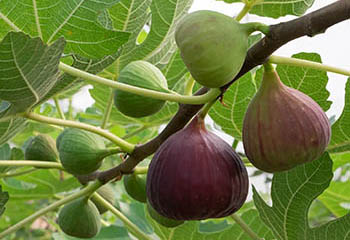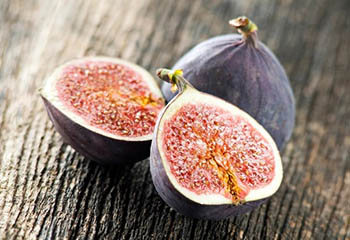Fig Tree (Ficus carica)
Map Position: 9
Figs are sweet and nutritious fruit, and most of us know and enjoy eating fig dried or fresh. Fresh figs, however, spoil quickly and are not often found in shops in our climate.
In Indian mythology the fig tree is scared. In ancient Greece and Rome figs were believed to be an aphrodisiac, its wood was used to carve erotic symbols.
In biblical times, dried figs were an important part of the diet. Figs also have medicinal uses such as laxatives, improve muscle performance, are full of trace elements, help in the treatment of skin conditions etc.
Figs are still important in the Mediterranaean economy.
Biblical
The fruits of fig trees are mentioned on many occasions in the Bible (ESV), often together with vine. We have found it mentioned 55 times, and we have selected a few that illustrate the importance of this tree and its fruit.
The first tree to be mentioned by name in the Bible is the fig tree, it is the only tree we know of that it grew in Paradise. When Adam and Eve had to leave paradise, they used the leaves of the fig tree to cover their nakedness (Genesis 3.7).

During their search for the Promised Land, the Lord instructed Moses to send men to spy out the land of Canaan and he instructed them to bring back some fruit from there (Numbers 13.20). So, when they returned, they brought grapes, pomegranates, and figs (Numbers 13.23).
When the Jews were in the desert they complained bitterly about “this evil place, […] no place for grain, or figs, or vines, or pomegranates” (Numbers 20.5).
The Jews were told to be thankful to the Lord who had led them to “a land of wheat and barley, of vines and fig trees” (Deuteronomy 8.8 and 1. Kings 4.25).
When in the town of Shechem, a brutal ruler was elected. Jotham, who was supposed to be the rightful king, told the people the parable of trees choosing their king: all the trees declined because they had other values to offer than power: the fig tree pointed out that producing its fruit was more important than ruling over other trees: “Shall I leave my sweetness and my good fruit and to go and to sway over the trees” (Judges 9.10 and 11, see also 11. Cedar).
Figs are mentioned as fruit in a rich land, also a savoury food (Deuteronomy 8.8, 1. Kings 4.25).
It is a sign of peace when everyone “will eat of his own vine and each one of his own fig tree” (2. Kings 18.31).
Isaiah was able to heal Hezekiah by giving him “a cake of figs” (2. Kings 20.7).
One of the plagues the Lord sent on the Egyptians was to destroy their crops and plants: “He struck down their vines and fig trees and shattered the trees of their country” (Psalm 105.33).
God will reward people who to do good and work hard: “Whoever tends a fig tree will eat its fruit” (Proverbs 27.18).
Through His prophet, the Lord tells the Israelites that He knows about the sins of their ancestors: “Like the first fruit on the fig tree, in its first season, I saw your fathers” (Hosea 9.10).
The Lord reminded the Jews that it was He who had punished them for their sinful life: “I struck you with blight and mildew; your many gardens and your vineyards, your fig trees and your olive trees the locust devoured; yet you did not return to me” (Amos 4.9). Amos “was a herdsman and a dresser of sycamore figs” (Amos 7.14).

The prophet tells us to rejoice in the Lord, even “though the fig tree should not blossom, nor fruit be on the vine […because…] God the Lord is my strength” (Habakkuk 3.17-19).
When the Jews had returned from exile in Babylon, they were encouraged by the prophet Haggai to rebuild their lives, and above all, the temple: “Is the seed yet in the barn? Indeed, the vine, the fig tree, the pomegranate, and the olive tree have yielded nothing? But from this day on I will bless you” (Haggai 2.19).
The arrival of a beloved person is an experience that can be compared to nature awakening in spring, when “The fig tree ripens its figs” (Song of Solomon 2.13).
Abigail bribed David who was about to fight Nabal among others with two hundred cakes of figs (1. Samuel 25.18). During a military campaign, David found a man who was dying because his master had left him behind in the desert: David saved his life, among other things, with a piece of cake of figs and the man was very grateful to David and became his servant (1. Samuel 30.12).
And fig trees and their fruit are mentioned
- as a medical remedy (Isaiah 38.21)
- as a disaster when figs are taken from you (Jeremiah 5.17)
- as a punishment from the Lord when there are no “figs on the fig tree” (Jeremiah 8.13, Isaiah 34.4, and Micah 7.1)
- in a parable, that good figs are like people who please the Lord; and as bad figs are thrown away, bad people will be destroyed (Jeremiah 24.1 – 24.10)
- that the fruit ripens before the summer (Isaiah 28.4)
- as a commodity for trade (1. Chronicles 12.40, Nehemiah 13.15, and Ezekiel 27.17)
- which will be taken from you if you acquire them through sin (Hosea 2.12)
- fig trees will be destroyed as a punishment for sinful living (Joel 1.7, 1.12), and fruitful fig trees are a reward of God (Joel 2.22, Isaiah 36.16, and Jeremiah 29.17)
- as a sign of peace and happiness, when no one has to be afraid that someone could take his land (Micah 4.4)
- as a sign of peaceful living, when neighbours sit together under a fig tree (1 Maccabees 14.12 and Zechariah 3.10)
- Nineveh’s destruction is compared to figs, that are eaten: “All your fortresses are like fig trees with first-ripe figs – if shaken they fall into the mouth of the eater” (Nahum 3.12).
In the New Testament Jesus points out that you know people by their deed, just as you know plants by their fruits, and you will not gather “figs from thistles” (Mathew 7.16 and Luke 6.44).
Jesus cursed a fig tree which did not bear fruit and “the fig tree withered at once” (Matthew 21. 19 -21 and Mark 11.13).
He told his disciples that they can achieve the same and perform other miracles as well if only they had faith and asked in prayer (Mathew 21.20 – 22). The same parable is told by Mark in 11.20 and 21.
Just as leaves sprouting on a fig tree indicate the coming summer there are signs of the Lord’s coming (Mathew 24.32 and Mark 13.28 and Luke 21.29).
A fig tree that does not bear fruit should be cut down, but with good care can bear fruit just as sinners should repent otherwise, they will perish (Luke 13.6 - 7).
Jesus proved that he is the Son of God to Nathanael as he told him that he knew he was sitting under a fig tree (John 1.48 – 50).
We must not use our mouths to bless the Lord and use the same mouths to curse people as the same (fig)tree will not bear olives or the grapevine figs (James 3.12).
The signs at the end of times are compared with fruits falling of the fig tree in a winter gale (Revelation 6.13).
